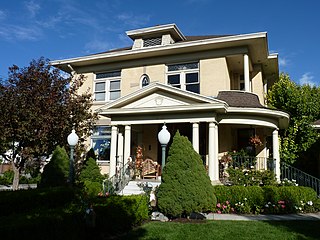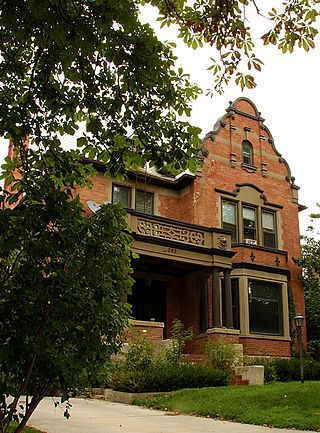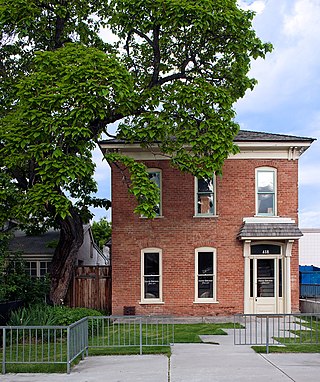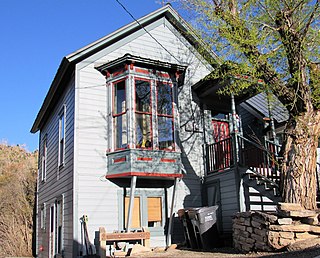The Avenues is an affluent neighborhood in Salt Lake City, Utah. It is named after the perfectly gridlike, closely laid out roads called Avenues and Streets. First surveyed in the 1850s, the Avenues became Salt Lake City's first neighborhood. Today, the Avenues neighborhood is generally considered younger, more progressive, and somewhat "artsy" when compared to other neighborhoods. Many young professionals choose to live there due to the culture and easy commute to downtown.. It is also one of the most important strongholds of the Utah Democratic Party.

The Lewis S. Hills House is a historic residence in Salt Lake City, Utah, United States, that is listed on the National Register of Historic Places (NRHP).

The South Temple Historic District is a 119-acre (48 ha) historic district that was the first to be listed in the Salt Lake City Register in 1976, and was listed on the National Register of Historic Places in 1982.

The Meriden Avenue–Oakland Road Historic District is a National Register of Historic Places district covering a residential section of Southington, Connecticut, located south of the center of town. At the time of the listing, in 1988, there were 113 buildings within the boundaries of the district, of which all but 22 are considered contributing. The period of significance for the district is 1860–1936. A residence built after 1936, or altered substantially qualifies as building as non-contributing. Only one building is deemed non-contributing due to extensive modelling.
Carl Martel Neuhausen was an American architect based in Salt Lake City, Utah. He designed a number of buildings that survive and are listed on the U.S. National Register of Historic Places.
Richard Karl August Kletting was an influential architect in Utah. He designed many well-known buildings, including the Utah State Capitol, the Enos Wall Mansion, the original Salt Palace, and the original Saltair Resort Pavilion. His design for the Utah State Capitol was chosen over 40 competing designs. A number of his buildings survive and are listed on the U.S. National Register of Historic Places including many in University of Utah Circle and in the Salt Lake City Warehouse District.

The Thomas N. Taylor House is a historic house located at 342 North 500 West in Provo, Utah. It is listed on the National Register of Historic Places.

The Charles E. Davies House is a historic house located in Provo, Utah. It is listed on the National Register of Historic Places.

The John R. Twelves House is a historic house located in Provo, Utah, United States. It is listed on the National Register of Historic Places.

The Almon A. Covey House is a historic house in northeastern Salt Lake City, Utah, United States, that is located within the University Neighborhood Historic District, but is individually listed on the National Register of Historic Places (NRHP).

The Carl M. Neuhausen House is a historic house in northeastern Salt Lake City, Utah, United States, that is located within the University Neighborhood Historic District, but is individually listed on the National Register of Historic Places (NRHP).
Frederick Albert Hale was an American architect who practiced in states including Colorado, Utah, and Wyoming. According to a 1977 NRHP nomination for the Keith-O'Brien Building in Salt Lake City, "Hale worked mostly in the classical styles and seemed equally adept at Beaux-Arts Classicism, Neo-Classical Revival or Georgian Revival." He also employed Shingle and Queen Anne styles for several residential structures. A number of his works are listed on the U.S. National Register of Historic Places.

The Albert H. Kelly House, at 418 South 200 West in Salt Lake City, Utah, was an Italianate house that was built in 1884 and demolished in the spring of 2021 to make way for an apartment complex. It was listed on the National Register of Historic Places in 1983.

The Ladies Literary Club Clubhouse, at 850 East South Temple St. in Salt Lake City, Utah, was built in 1913. It was designed by architects Treganza & Ware in Prairie School style.

The Frederick A. E. Meyer House is a historic house located at 929 East 200 South in Salt Lake City, Utah.

The John C. Sharp House, located off Utah 36 in Vernon, Utah, is an Italianate house that was built in 1888.

The East Main Street Historic District of Searsport, Maine encompasses an architecturally distinctive collection of five residential properties on United States Route 1 east of the town center. All five houses are at least somewhat Italianate in style, and were built by ship's captains between about 1860 and 1875. The district was listed on the National Register of Historic Places in 1991; three of the properties are also individually listed.

The Joseph J. Jenkins House, at 27 Prospect Ave. in Park City, Utah, was built in 1891. It was listed on the National Register of Historic Places in 1984.
Francis Charles Woods was a Scottish-born American architect and organ-builder who designed many buildings in Utah and Idaho. Some of his works are listed on the National Register of Historic Places (NRHP), including the Hotel Brigham and the Summit County Courthouse.
















